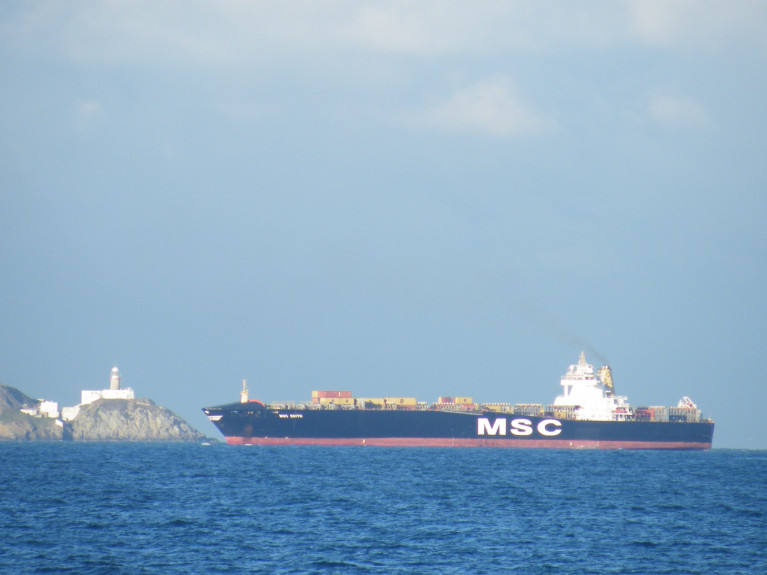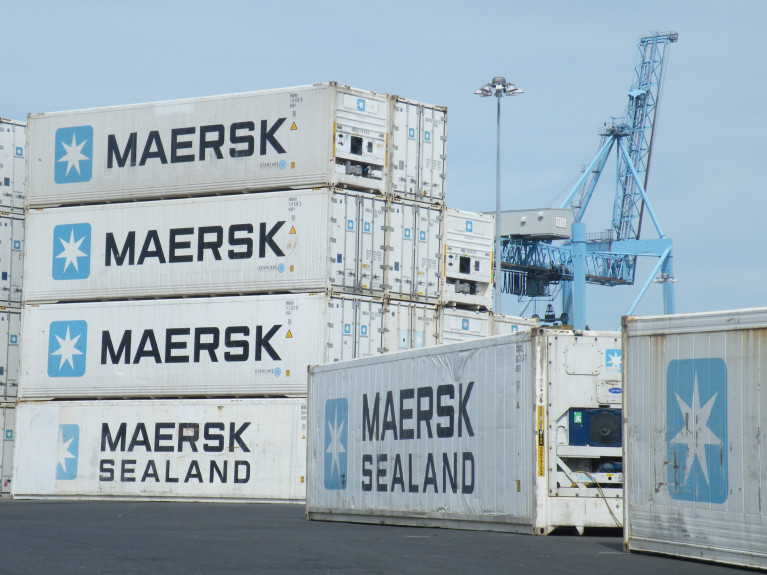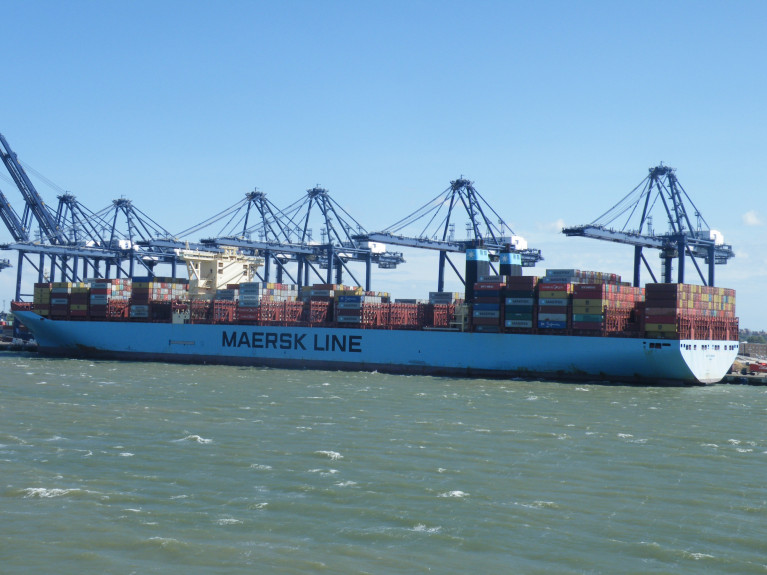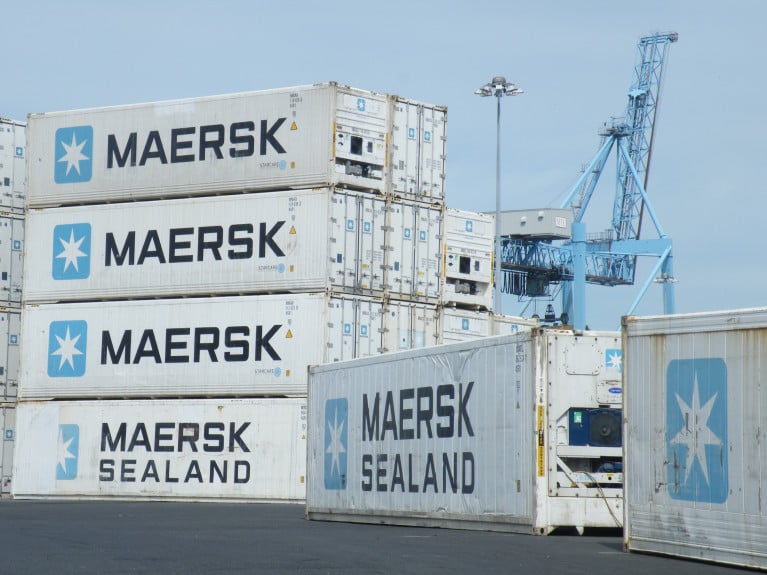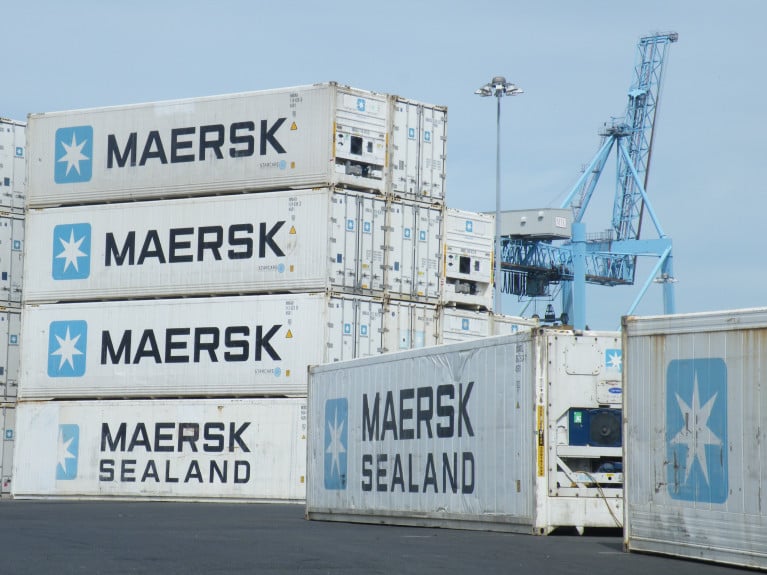Displaying items by tag: maersk
World’s Largest Container Operator Hopes for Better Times Amid Red Sea Houthi Airstrikes
Global container line, AP Moller-Maersk hopes the presence of naval forces in the Red Sea in addition to political action will allow vessels to resume transiting the Middle East waterway, a major international link between the Indian subcontinent, Asia and Europe.
According to Tradewinds, the Danish-owned Maersk is among several prominent container shipping lines to have suspended its vessels using the Red Sea and the Suez Canal, due to Yemen’s Houthi rebels that have threatened and carried out attacks on merchant ships.
Both the UK and USA have taken military action, having launched more than 60 airstrikes against Houthi targets early on Friday (today, 12 Jan.) in an attempt to try and prevent further attacks in the Red Sea.
In an email to Reuters issued by Maersk they said “We hope that these interventions and a larger naval presence will eventually lead to a lowered threat environment allowing maritime commerce to transit through the Red Sea and once again return to using the Suez Canal as a gateway”
Also today, the multinational Combined Maritime Forces have advised international merchant ships plying the Bab el-Mandeb strait (between Yemen, Arabian Peninsula and Djibouti and Eritrea, Horn of Africa) to stay clear following a bombing campaign in Yemen.
The 70 mile long strait is where the Red Sea meets the Gulf of Aden, which by extension links the Indian Ocean. Notably, the narrow-most point along the strait is just short of 16 nautical miles.
More here on the development in the region.
Container shipping giant AP Moller-Maersk has diverted 26 of its own vessels around the Cape of Good Hope in the last 10 days or so, while only 5 more were scheduled to start the same journey according to detailed breakdown by Reuters.
The operator Maersk based in Denmark will sail almost all their vessels travelling between Asia and Europe through the Suez Canal. The move from now takes place while diverting only a handful of vessels around Africa, a Reuters breakdown of the group's schedule showed today.
Asides Maersk, other major shipping companies, including MSC, the world's biggest container line and Hapag-Lloyd, stopped using Red Sea routes and also the Suez Canal earlier this month according to Reuters. This followed incidents carried out by Yemen's Houthi militant group which began targeting vessels and thus disrupting international trade.
The container operators’ instead rerouted ships around the African continent via the Cape of Good Hope in South Africa to avoid attacks. This led to charging customers extra fees coupled in adding further days or indeed weeks to the time it takes to transport goods from Asia to Europe and across the Atlantic Ocean to North America with calls to east coast ports.
It was however announced by Maersk on 24 December to say it was preparing a return of containerships to the Red Sea, citing a US-led military operation to deploy naval vessel to the region and protect such vessels.
Maersk also yesterday released sailing schedules that showed ships were headed for the Suez Canal and this is to take place in forthcoming weeks. RTE News has more.
Afloat adds the Swiss-based MSC has a container fleet total of 800 vessels combined with a 22.50 TEU capacity (annually as estimated by Maersk in 2022).
As of May 2023, Maersk was operating 682 container ships with a combined capacity of around 4.13 million TEUs. While, Hapag-Lloyd offers a fleet with a vessel capacity 2.0 million TEU, as well as a container capacity 2.90 million TEU.
Global Container Operator Maersk Sees Full-Year Profits at Lower End; Is to Cut 10,000 Jobs
Danish shipping group AP Moller-Maersk has reported a steep drop in profit and revenue in the third-quarter of this year.
The giant operator which has a fleet of more than 700 vessels among them Laura Maersk, has said it would cut 10,000 jobs as it battles with lower freight rates and subdued demand for container shipping.
The Copenhagen based group has kept its full-year guidance for revenue and operating profit but now expects both to land at the lower end of the range.
"Our industry is facing a new normal with subdued demand, prices back in line with historical levels and inflationary pressure on our cost base," CEO Vincent Clerc said in a statement.
"Since the summer, we have seen overcapacity across most regions triggering price drops and no noticeable uptick in ship recycling or idling," he said.
The group which has 65 terminals across 36 countries, had already in August warned of a steeper decline in global demand for shipping containers by sea this year. The reason cited was due to slow economic growth and destocking in the aftermath of the Covid-19 pandemic.
RTE News has more.
Maersk Files Claim for Blocking of Suez Canal
Maersk shipping group has filed a claim for compensation against the owners and operators of the container ship Ever Given, which blocked the Suez Canal for six days in 2021.
The Danish shipping group, regarded as the largest in the world, is claiming compensation for delays caused by the blockage. It has not disclosed the size of the claim or when it was filed. Industry media ShippingWatch.dk and gCaptain shipping websites have reported that Maersk has raised the claim against Evergreen, the ship’s owners and the technical manager at the Danish Maritime and Commercial High Court, because Maersk suffered losses in connection with Ever Given’s blocking of the Suez Canal.
Ever Given, one of the world’s largest container ships, became jammed across the canal in high winds for six days in March 2021, halting traffic in both directions and disrupting global trade.
Global Distribution Giant Maersk Inks Deal with Iput for 252,000sq ft of Dublin Logistics Space
IPUT Real Estate, an Irish property group has secured a significant coup with global logistics operator Maersk by signing for a total of 252,000sq ft of space at its latest logistics scheme in Dublin.
News of Maersk’s decision to locate its operations in unit 3 (178,000sq ft) and unit 4 (74,000sq ft) at Quantum Logistics Park near Dublin Airport follows international retailer Harvey Norman pre-let agreement last December for unit 2 (91,524sq ft) and DHL’s pre-letting of unit 1 (206,000sq ft) earlier this summer.
The completion of the three deals brings all 549,524sq ft at the north Dublin scheme to full occupancy in advance of its ultimate completion in the second quarter of 2023.
Located at Kilshane Cross and within a short drive of Dublin Airport, the Dublin Port Tunnel, Dublin city centre, and the M50 and wider motorway network, Quantum Logistics Park is being developed to the highest sustainability standards in the market with LEED Gold and BREEAM Excellent ratings.
The Irish Times has more on this commercial property development.
New Container Giant: MSC to Overtake Maersk as Top Box-Line After Brazilian Acquisition
LloydsLoadingList reports that the board of Brazilian regional container line Log-In – Logistica Intermodal S.A., has approved the acquisition of a 67% stake in the company by Mediterranean Shipping Company (MSC) in a bid valuing Log-In at just over $500m.
Log-In has seven boxships in service with another two on order.
Maritime analyst Lars Jensen, CEO of Vespucci Maritime, said: “MSC is now the world’s largest container carrier. With the board approval to buy Log-In, this will add some 15,000 TEU of additional capacity to the fleet controlled by MSC, placing them ahead of Maersk.”
He cites Alphaliner’s top 100 ranking table which shows:
Maersk with 4,264,054 TEU
MSC with 4,256,172 TEU
Log-In with 15,462 TEU.
So adding 15,462 TEU to MSC gives it a total of 4,271, 634 TEU, making it top of the table, he said.
More here on MSC's buying spree, noting the global container operator Afloat adds has an Irish office located in Sandyford, Co. Dublin.
Shipping container giant, Maersk revealed that it will make around 2,000 staff redundant due to changes to the organisation linked to the integration of Damco into its Ocean Logistics business and the removal of the separate Safmarine brand, which it announced last month.
In a trading update for its third-quarter (Q3) 2020 performance and 2020 full year guidance adjustment, in which the world’s largest container shipping group also reported better-than-anticipated volumes and freight rates in the past three months.
Maersk said it “expects to take a restructuring charge of around US$100m in Q3 2020 related to the redundancies of approximately 2,000 employees as the consequence of the changes to the organisation in Ocean and Logistics & Services announced on 1 September 2020”.
With parent group A.P. Moller-Maersk announcing its was upgrading its full-year guidance for 2020 based on preliminary Q3 figures and the current outlook for Q4, Søren Skou, CEO of A.P. Moller - Maersk said: “A.P. Moller - Maersk is on track to deliver a strong Q3 with solid earnings growth across all our businesses, in particular in Ocean and Logistics & Services. Volumes have rebounded faster than expected, our cost have remained well under control, freight rates have increased due to strong demand and we are growing earnings rapidly in Logistics & Services.
More here LloydsLoadingList reports.
World's Largest Container Line Maersk Reports of Profits Up on Lower Volumes & Higher Rates
The world’s largest container shipping line, Maersk, saw profits spike during second quarter pandemic lockdowns as declining volumes were offset by higher freight rates and reduced operating costs.
Parent company A.P. Moller-Maersk (APMM), writes LloydsLoadingList, reported improved profitability across all businesses during Q2. APMM attributed its success to “agile capacity deployment, cost mitigation initiatives and adaption to changed customer needs, with higher ocean freight rates and lower fuel costs helping mitigate the decline in ocean volumes.
Maersk reported that East-West volumes fell 14.9% year-on-year in the second quarter but this was offset by average freight rates on the services rising 8.2%. And, while loaded volumes on North-South services dropped 18.6% in the period, average freight rates increased 5.2%.
Total ocean operating costs decreased by 16% to $5.2 billion in Q2, driven by lower network costs including bunker and time charter costs, reported APMM, with “active capacity management in response to the lower global demand partly offsetting the impact of lower volumes”.
Overall group revenue decreased by 6.5% year-on-year in Q2 to $9.6 billion, mainly driven by a volume decrease of 16% in ocean loadings and a 14% drop in handling at its gateway terminals.
For further analysis click here of the giant container operator.
Danish shipping group AP Moller-Maersk has today warned of a sharp drop in global container volumes due to the coronavirus pandemic, sending its shares down sharply.
The coronavirus epidemic has thrown the global container shipping trade off balance as global supply chains have been upended and businesses and factory activity in China and later across the world was disrupted.
Maersk, which also reported a 23% rise in first-quarter core profits, now expects global container demand to contract this year, after previously forecasting growth of 1%-3%.
"As global demand continues to be significantly affected, we expect volumes in the second quarter to decrease across all businesses, possibly by as much as 20%-25%," chief executive Soren Skou said.
More from RTE News here.
World's Largest Box Carrier Warns Coronavirus Could Significantly Impact Q1 Earnings
The world's largest box-carrier, Maersk Line has reported improved profits in 2019 despite bearish global container growth.
However, A.P. Moller-Maersk (APMM), the parent company of the container shipping giant, warned that the spread of the coronavirus and the shutdown of large parts of the Chinese economy would be damaging for 2020 first quarter earnings given its impact on the group’s liner, logistics and warehousing activities.
“We estimate that right now that factories in China are operating at 50-60% capacity and will be ramping up to around 90% capacity by the first week of March,” said Søren Skou, CEO of APMM, in an earnings call earlier this morning.
Maersk Line has already cancelled 50 sailings in addition to services that were blanked for Chinese New Year holidays and factory closures in late January.
Lloyds Loading List has much more on the container-carrier.
As Afloat reported earlier today, the Irish Exporters Association warned a number of Irish companies are going to be impacted by the coronavirus.


























